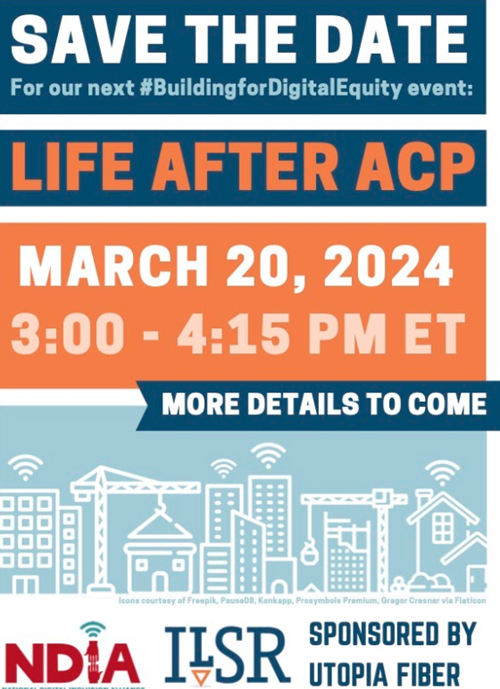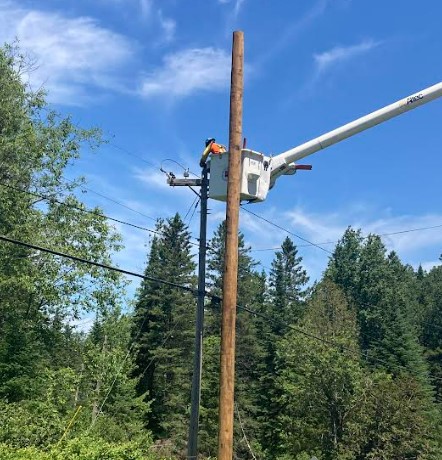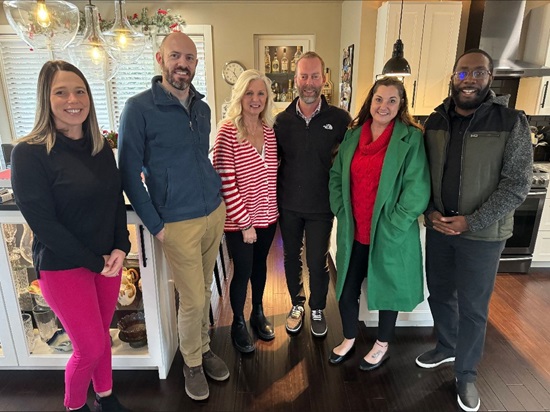
Fast, affordable Internet access for all.


Episode 591 of the Community Broadband Bits Podcast features a panel from Net Inclusion that Christopher Mitchell moderated entitled, "Without Political Power, There is No Path to Digital Equity." In it, panelists raise difficult questions for the digital equity movement about whether they are on track to achieve their goals - whether the main strategies used today can result in digital equity or are destined to fall well short.
Panelists include Melanie Silva, COO of Hinton & Company in Chattanooga; Shayna Englin, Director of the Digital Equity Initiative at the California Community Foundation; Joshua Edmonds, CEO of Digital C in Cleveland; and Dan Ryan, Vice-Chair of the Enterprise Center in Chattanooga.
The discussion includes constructive criticism of the movement for digital equity, as well as more specific criticism of the decision to move the Net Inclusion conference from Chattanooga to Philadelphia. That decision was entangled with - and justified by - the concerns of some regarding safety in the wake of attempts in the Tennessee Legislature to revoke the rights of Transgender individuals, among others. The panel felt it was important not to ignore those issues as we wrangled with the larger issue of building a better society with more rights and opportunities for everyone.
We hope you find this discussion useful and respectful of the larger movement despite disagreements on some important issues.
This show is 93 minutes long and can be played on this page or using the podcast app of your choice with this feed.
Transcript below.
We want your feedback and suggestions for the show: please e-mail us or leave a comment below.
Listen to other episodes here or see other podcasts from the Institute for Local Self-Reliance here.
Thanks to Arne Huseby for the music. The song is Warm Duck Shuffle and is licensed under a Creative Commons Attribution (3.0) license.
As the Affordable Connectivity Program (ACP) nears its end, our first Building For Digital Equity livestream of 2024 will focus on what digital inclusion practitioners across the nation are doing to ensure that as many ACP recipients as possible do not lose access to high-speed Internet.
The free virtual gathering – #B4DE Life After ACP – will be held on March 20, 2024 from 3 to 4:15 PM ET.
Attendees are encouraged to register now here.
As the FCC is in the midst of winding down the ACP, which will run out of funds by April, it’s anybody’s guess just how many of the nearly 23 million Americans enrolled in the program will be forced to discontinue their Internet service because they can no longer afford it. But, if the 1,300 digital equity advocates who descended on Net Inclusion 2024 in Philadelphia two weeks ago is any indication, one thing is certain: the national effort to tackle the broadband affordability crisis will continue – even in the absence of ACP.
Sponsored once again by UTOPIA Fiber and co-hosted by the National Digital Inclusion Alliance (NDIA) and ILSR’s Community Broadband Networks Initiative, the line-up of frontline digital inclusion practitioners will share their outlook and strategies and help provide attendees with a road map in dealing with the imminent demise of the program.
The livestream will be available (and later archived) on Facebook, YouTube, X (formerly Twitter), and LinkedIn, with live viewer questions answered by the invited speakers and presenters. We recommend viewing it on YouTube where the live chat will be most engaging. Other questions can be submitted using the #B4DE hashtag on X.
With the nation's premier digital inclusion conference in full swing right now in Philadelphia – and with yet another banner year in broadband in the making – the first Building For Digital Equity (B4DE) livestream event of the year is now set for March 20.
As you read this, the National Digital Inclusion Alliance (NDIA), organizers of Net Inclusion 2024, are engaging with hundreds of digital inclusion practitioners, advocates, academics, Internet service providers, and policymakers from across the nation at the conference. Joining them there in the City of Brotherly Love is a full complement of the Institute for Local Self Reliance (ILSR) Community Broadband Networks team. The energy and ideas from the event will inform the upcoming B4DE that will feature the theme: Life After ACP.

We encourage you to save the date and register here for the popular (and free) virtual gathering to be held March 20, 2024 from 3 to 4:15 PM ET.
Coming on the heels of our last B4DE event in December, digital inclusion advocates are strategizing around how to tackle the broadband affordability challenge as the FCC winds down the Affordable Connectivity Program (ACP).
NEK Broadband continues to bring affordable fiber access to the long-neglected corners of the Green Mountain State. According to the latest update by NEK Broadband, a recently completed rollout has delivered affordable fiber access to 700 new addresses across multiple rural Vermont communities.
NEK Broadband is one of nine Communications Union Districts (CUDs) scattered across the state of Vermont. NEK Broadband alone represents 45 Vermont communities across Caledonia, Essex, Orleans and Lamoille Counties in the northeast part of the state (see the full list of communities here).
The CUD’s latest expansion plan primarily focused on bringing fiber access to parts of Danville, Kirby, Lyndon, St. Johnsbury, Walden and Wheelock, Vermont. With this latest expansion, NEK Broadband now provides fiber access to 2,100 predominantly rural Vermont residents in total, many of which only received broadband for the first time last year.
“We’re so pleased to end 2023 by giving more residents of the NEK access to high-speed internet,” Christa Shute, NEK Broadband’s Executive Director, said in a prepared statement. “We plan to bring even more residents online in early 2024.”

The CUD currently provides upgraded users with access to speeds that exceed those provided by cable and DSL providers, even in many more urban markets.
NEK Broadband currently offers four tiers of broadband service: symmetrical 50 megabit per second (Mbps) service for $80 a month; symmetrical 250 Mbps service for $103 a month; symmetrical 500 Mbps service for $135 a month; and a symmetrical gigabit per second (Gbps) offering for $250 a month.

In this latest episode of the podcast, Christopher is joined once again by Sean Gonsalves to delve into the expanding landscape of municipal broadband networks in the U.S. They emphasize the noteworthy surge in municipal networks, citing the establishment of 47 new networks since 2021, which has brought the total to over 400!
This discussion explores the various models and approaches taken by these networks while touching on the challenges faced by these municipal networks, such as opposition from large ISPs and the importance of community support and engagement.
Additionally, Chris and Sean emphasize the significance of data from schools and organizations in comprehending the current state of broadband access and advancing digital equity.
This show is 38 minutes long and can be played on this page or via Apple Podcasts or the tool of your choice using this feed.
Transcript below.
We want your feedback and suggestions for the show-please e-mail us or leave a comment below.
Listen to other episodes or view all episodes in our index. See other podcasts from the Institute for Local Self-Reliance.
Thanks to Arne Huseby for the music. The song is Warm Duck Shuffle and is licensed under a Creative Commons Attribution (3.0) license.
Waterloo, Iowa’s municipal broadband project has taken a major step forward after nearly two decades of planning.
Waterloo Fiber officials just launched their first limited fiber trial, will connect their first commercial customers in February, and are on target to deploy affordable fiber at speeds up to 10 gigabit per second (Gbps) to every last city resident by 2026.
When we last checked in with Waterloo in February of last year, the city was putting the finishing touches on a plan to spend $115 million to build a fiber backbone accessible to all 67,695 Waterloo residents, after locals approved the city issuing general obligation bonds to fund the start of the three-phase construction project.
Construction of the network began last summer at a groundbreaking ceremony hosted by Waterloo Mayor Quentin Hart.
“It will be the lifeline that connects our entire community, enabling businesses to thrive, students to excel and families to stay connected," Hart told attendees. "This fiber system will lay the foundation for a smart city innovation, economic growth and an enhanced quality of life for all our residents."

Last month the city connected the first of four participants in a limited pilot project.
As digital inclusion practitioners and broadband-for-all advocates continue to push Congress to save the Affordable Connectivity Program (ACP), 22.5 million Americans now enrolled in the program are weeks away from being officially notified of its pending termination as ACP funds are on track to be depleted by the end of April.
The looming demise of the ACP – which provides income-eligible households with a $30 monthly voucher to pay for pricey Internet service bills ($75/month for Tribal citizens living on reservations) – comes at a crucial moment in the rollout of the “Internet For All” initiative. All 56 States and U.S. territories are poised to receive nearly $45 billion in broadband expansion funds from the bipartisan infrastructure law over the next year.
Separate from the BEAD program and Digital Equity Act funding, the bipartisan infrastructure law also established the ACP with a $14.2 billion allocation. At current enrollment rates, the program disburses about $650 million per month to Internet service providers (ISPs).

This week on the podcast, Christopher speaks with Blair Levin, the former executive director of the National Broadband Plan, to discuss the landscape of broadband and telecommunications and its significance moving into 2024.
Chris and Blair delve into discussions on the FCC and its imperative to address critical issues such as the Affordable Connectivity Program (ACP) and the fate of Title II.
The conversation continues with topics on the potential for industry mergers, the evolving landscape of fixed wireless and fiber networks, and the persistent challenges associated with achieving universal service and bridging the digital divide. It concludes with touching upon the critical fiber-copper divide and underscores the importance of local government initiatives in expanding fiber networks.
This show is 44 minutes long and can be played on this page or via Apple Podcasts or the tool of your choice using this feed.
Transcript below.
We want your feedback and suggestions for the show-please e-mail us or leave a comment below.
Listen to other episodes or view all episodes in our index. See other podcasts from the Institute for Local Self-Reliance.
Thanks to Arne Huseby for the music. The song is Warm Duck Shuffle and is licensed under a Creative Commons Attribution (3.0) license.

This week on the final podcast of the year, join us as the staff gets together to get a handle on what happened in the broadband landscape in 2023. Returning to join Christopher are Ry Marcattilio, Christine Parker, DeAnne Cuellar, Emma Gautier, and Sean Gonsalves along with new staff members Jordan Pittman and Angelina Paniagua.
Together, they discuss the BEAD rollout, data and mapping, new municipal fiber projects, the FCC's fifth commissioner, and 2023's broadband "scandals." Give this episode a listen to find out how last year's predictions help up!
This show is 47 minutes long and can be played on this page or via Apple Podcasts or the tool of your choice using this feed.
Transcript below.
We want your feedback and suggestions for the show-please e-mail us or leave a comment below.
Listen to other episodes or view all episodes in our index. See other podcasts from the Institute for Local Self-Reliance.
Thanks to Arne Huseby for the music. The song is Warm Duck Shuffle and is licensed under a Creative Commons Attribution (3.0) license.
Capping off a banner year in broadband, ILSR and NDIA’s final Building for Digital Equity livestream of 2023 this week had its largest audience to date since the online quarterly series started in 2022.
Digital Equity Unwrapped: End of Year Reflections/The New Year Ahead, sponsored by UTOPIA Fiber, featured timely topics and practical insights from an array of frontline digital inclusion practitioners, teeing up Net Inclusion 2024 – the biggest in-person gathering of digital equity advocates in the nation.
That event will be hosted by the National Digital Inclusion Alliance (NDIA) in Philadelphia, February 13-15, 2024.
If you missed the #B4DE 2023 finale or would like to see it again, you can watch it in its entirety below.
It includes lightning round presentations from the Administrator for Chicanos Por La Causa (CPLC) Nubia Estrada and OCA Asian Pacific American Advocates Policy & Organizing Manager Eric Kim; a preview of this year’s Trailblazer Awards with a special guest appearance by Rebecca Kauma, LA County’s Director of Digital Equity; and an update on the work being done by Shaping Our Appalachian Region (SOAR) Digital Navigator Ashley Smith.
Putting a bow on the holiday season event was keynote speaker Patrick Messac, Director of the Bay Area-based digital equity nonprofit #OaklandUndivided. Messac connected the dots on the importance of equitable infrastructure investments, mapping, and ways local communities might leverage the FCC’s new rules to address digital discrimination.